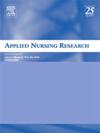沟通能力、工作意义、工作与生活平衡对韩国Z世代护士离职意向的影响:一项横断面研究
IF 2.7
4区 医学
Q1 NURSING
引用次数: 0
摘要
目的探讨沟通技巧、工作意义、工作与生活平衡对Z世代护士离职意向的影响,并探讨这些因素之间的相关性。护理机构需要重新评估员工保留策略,以适应刚刚开始进入职场的Z世代的独特属性。方法数据采集时间为2023年7月24日至9月10日,选取D市3所大学医院500张以上床位的Z世代护士作为方便样本。共有179名护士参与研究,均为95后,具有6个月临床经验。结果员工离职意向与工作意义性显著相关(r = -0.327, p <;0.001)和工作-生活平衡(r = -0.613, p <;0.001)。然而,沟通技巧与离职倾向并无显著相关。分层多元回归分析显示,离职意向与临床经验(β = 0.139, p = 0.020)、每月一次业余爱好(β = -0.166, p = 0.036)、工作与生活平衡(β = -0.603, p <;0.001)。模型3的解释能力为45.6%。结论基于这些结果,建议组织制定和管理针对Z世代护士的干预方案,以提高他们对当前工作单位的满意度。此外,应该探索和实施促进工作与生活平衡的措施,以减少人员流失。本文章由计算机程序翻译,如有差异,请以英文原文为准。
The effects of communication competence, meaning of work, and work-life balance on turnover intention in Generation Z nurses in South Korea: A cross-sectional study
Aim
This study aimed to identify the effects of communication skills, meaningfulness of work, and work-life balance on turnover intention in Generation Z nurses, and investigate the correlations between these factors.
Background
Nursing organizations need to reassess staff retention strategies to accommodate the unique attributes of Generation Z, which is just beginning to enter the workforce.
Methods
Data were collected from July 24 to September 10, 2023, using a convenience sample of Generation Z nurses employed in three university hospitals, each with over 500 beds, in D Metropolitan City. A total of 179 nurses participated in the study, all born after 1995 and with >6 months of clinical experience.
Results
Turnover intention was significantly correlated with meaningfulness of work (r = –0.327, p < 0.001) and work-life balance (r = –0.613, p < 0.001). However, communication skills were not found to be significantly correlated with turnover intention. Hierarchical multiple regression analysis revealed statistically significant relationships between turnover intention and clinical experience (β = 0.139, p = 0.020), engaging in hobbies once a month (β = –0.166, p = 0.036), and work-life balance (β = –0.603, p < 0.001). The explanatory power was 45.6 % in model 3.
Conclusions
Based on these results, it is recommended that organizations develop and manage intervention programs for Generation Z nurses to improve their satisfaction with their current work units. Additionally, measures to promote work-life balance should be explored and implemented to reduce turnover.
求助全文
通过发布文献求助,成功后即可免费获取论文全文。
去求助
来源期刊

Applied Nursing Research
医学-护理
CiteScore
4.50
自引率
0.00%
发文量
65
审稿时长
70 days
期刊介绍:
Applied Nursing Research presents original, peer-reviewed research findings clearly and directly for clinical applications in all nursing specialties. Regular features include "Ask the Experts," research briefs, clinical methods, book reviews, news and announcements, and an editorial section. Applied Nursing Research covers such areas as pain management, patient education, discharge planning, nursing diagnosis, job stress in nursing, nursing influence on length of hospital stay, and nurse/physician collaboration.
 求助内容:
求助内容: 应助结果提醒方式:
应助结果提醒方式:


